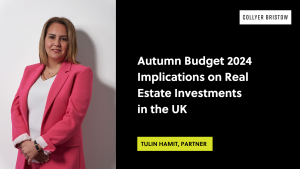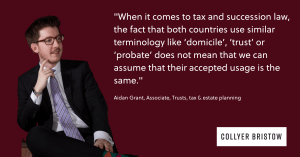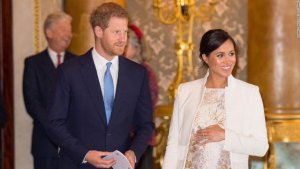- International trusts, tax and estate planning

Longer Reads
Are Harry and Meghan still exposed to UK tax?
Associate Aidan Grant considers the tax implications for Harry and Meghan as they announce they are expecting their second child.
2 minute read
Published 15 February 2021
Key information
- Specialisms
- Private Wealth
News of a baby is always a joyous celebration for a couple and their family. For the estate planning lawyer, it represents a timely opportunity for the couple to reflect on their planning and whether it still achieves the desired objectives. Shortly after the birth of Harry and Meghan’s first child I wrote of the difficulties Meghan faced from being a US citizen living in the UK and how the two jurisdictions sought to tax her at the same time (available here).
Now that Harry and Meghan have ceased to be UK resident, does that mean that they are no longer exposed to UK tax?
Answering that question depends on which individual and which taxes we are talking about. Harry and Meghan are no longer UK residents, meaning that HMRC will no longer seek to tax them on their worldwide income and capital gains (subject to Meghan’s ability to have claimed the remittance basis of taxation). Instead, as non-residents, Harry and Meghan are, generally speaking, only liable to UK tax on their UK-situs income and on specific UK capital gains (such as on the sale of UK land).
Where matters become more complex is over the question of inheritance tax, and whether Harry and/or Meghan are still UK domiciled (or deemed domiciled). If an individual is UK domiciled or deemed domiciled then their worldwide estate is exposed to inheritance tax. Conversely, if they are neither UK domiciled nor deemed domiciled then broadly speaking only their UK assets are exposed to inheritance tax (and, even then, subject to the potential reliefs provided by a relevant tax treaty).
Domicile (for UK purposes) is based on the common law concept of where an individual’s permanent home is, i.e. the jurisdiction to which they feel the strongest ties. Having since returned to the US, one might understandably argue that Meghan does not consider the UK her permanent home anymore (or, indeed, whether she ever did in the first place).
- If Meghan never became UK domiciled, then her departure from the UK is relatively straightforward – she did not live here long enough to become deemed UK domiciled (UK resident for 15 out of the last 20 tax years) and, provided she remains outside the UK for six complete tax years, that ’15 out of 20 year’ clock would start afresh on her resumption of UK residence. Of course Meghan could always return with an intention to remain here permanently, giving her an actual UK domicile.
- However, if Meghan had actually become UK domiciled while living here, then she will remain deemed UK domiciled for a period of three calendar years from the date that she subsequently lost that UK domicile. This anti-avoidance rule prevents individuals leaving the UK, declaring themselves non-domiciled and then promptly engaging in activities that would have otherwise incurred UK tax had they remained UK domiciled.
Harry poses an entirely different conundrum. It is entirely arguable that, as an individual born into the Royal Family and whose grandmother is the sitting monarch, it would be impossible for Harry to throw off his UK shackles to such an extent to convince anyone that he doesn’t ultimately still consider the UK his permanent home. Indeed, similar rules already exist for sitting Members of Parliament who, since 2010, are considered automatically UK resident and domiciled. Were Harry to attempt to claim non-domiciled status one suspects it might set off a small, tax-shaped explosion at the heart of the British monarchy and in the broadsheets.
However, if we imagine that Harry had indeed successfully lost his domicile status, then he would be in the same position as Meghan, i.e. he would remain deemed UK domiciled for three calendar years. That said, HMRC would treat them very differently upon their return to the UK. Whereas Meghan would have restarted her ’15 out of 20 years’ clock, Harry would be considered a ‘formerly domiciled resident’, i.e. an individual born in the UK with a UK domicile of origin, who moved overseas and acquired a new domicile of choice, before becoming UK resident again. In those circumstances, upon resuming UK residence, Harry would be considered deemed UK domiciled from the first tax year of his return for income tax and capital gains tax, and for inheritance tax the following tax year. As such, for the rest of his life Harry can only over avoid the tax consequences of deemed UK domicile status while he remains non-resident.
All of this is to say nothing of the application of the US/UK Gift and Estate Tax Treaty, which governs what to do when both the US and UK claim an individual as a domiciliary of their respective jurisdiction. But that is, perhaps, for another time.
Related content
Longer Reads
Are Harry and Meghan still exposed to UK tax?
Associate Aidan Grant considers the tax implications for Harry and Meghan as they announce they are expecting their second child.
Published 15 February 2021
Associated sectors / services
Authors
News of a baby is always a joyous celebration for a couple and their family. For the estate planning lawyer, it represents a timely opportunity for the couple to reflect on their planning and whether it still achieves the desired objectives. Shortly after the birth of Harry and Meghan’s first child I wrote of the difficulties Meghan faced from being a US citizen living in the UK and how the two jurisdictions sought to tax her at the same time (available here).
Now that Harry and Meghan have ceased to be UK resident, does that mean that they are no longer exposed to UK tax?
Answering that question depends on which individual and which taxes we are talking about. Harry and Meghan are no longer UK residents, meaning that HMRC will no longer seek to tax them on their worldwide income and capital gains (subject to Meghan’s ability to have claimed the remittance basis of taxation). Instead, as non-residents, Harry and Meghan are, generally speaking, only liable to UK tax on their UK-situs income and on specific UK capital gains (such as on the sale of UK land).
Where matters become more complex is over the question of inheritance tax, and whether Harry and/or Meghan are still UK domiciled (or deemed domiciled). If an individual is UK domiciled or deemed domiciled then their worldwide estate is exposed to inheritance tax. Conversely, if they are neither UK domiciled nor deemed domiciled then broadly speaking only their UK assets are exposed to inheritance tax (and, even then, subject to the potential reliefs provided by a relevant tax treaty).
Domicile (for UK purposes) is based on the common law concept of where an individual’s permanent home is, i.e. the jurisdiction to which they feel the strongest ties. Having since returned to the US, one might understandably argue that Meghan does not consider the UK her permanent home anymore (or, indeed, whether she ever did in the first place).
- If Meghan never became UK domiciled, then her departure from the UK is relatively straightforward – she did not live here long enough to become deemed UK domiciled (UK resident for 15 out of the last 20 tax years) and, provided she remains outside the UK for six complete tax years, that ’15 out of 20 year’ clock would start afresh on her resumption of UK residence. Of course Meghan could always return with an intention to remain here permanently, giving her an actual UK domicile.
- However, if Meghan had actually become UK domiciled while living here, then she will remain deemed UK domiciled for a period of three calendar years from the date that she subsequently lost that UK domicile. This anti-avoidance rule prevents individuals leaving the UK, declaring themselves non-domiciled and then promptly engaging in activities that would have otherwise incurred UK tax had they remained UK domiciled.
Harry poses an entirely different conundrum. It is entirely arguable that, as an individual born into the Royal Family and whose grandmother is the sitting monarch, it would be impossible for Harry to throw off his UK shackles to such an extent to convince anyone that he doesn’t ultimately still consider the UK his permanent home. Indeed, similar rules already exist for sitting Members of Parliament who, since 2010, are considered automatically UK resident and domiciled. Were Harry to attempt to claim non-domiciled status one suspects it might set off a small, tax-shaped explosion at the heart of the British monarchy and in the broadsheets.
However, if we imagine that Harry had indeed successfully lost his domicile status, then he would be in the same position as Meghan, i.e. he would remain deemed UK domiciled for three calendar years. That said, HMRC would treat them very differently upon their return to the UK. Whereas Meghan would have restarted her ’15 out of 20 years’ clock, Harry would be considered a ‘formerly domiciled resident’, i.e. an individual born in the UK with a UK domicile of origin, who moved overseas and acquired a new domicile of choice, before becoming UK resident again. In those circumstances, upon resuming UK residence, Harry would be considered deemed UK domiciled from the first tax year of his return for income tax and capital gains tax, and for inheritance tax the following tax year. As such, for the rest of his life Harry can only over avoid the tax consequences of deemed UK domicile status while he remains non-resident.
All of this is to say nothing of the application of the US/UK Gift and Estate Tax Treaty, which governs what to do when both the US and UK claim an individual as a domiciliary of their respective jurisdiction. But that is, perhaps, for another time.
Associated sectors / services
- International trusts, tax and estate planning
Authors
Need some more information? Make an enquiry below.
Subscribe
Please add your details and your areas of interest below
Article contributor
Aidan
GrantPartner
Specialising in International trusts, tax & estate planning, Private wealth, UK trusts, tax & estate planning and US/UK Tax & estate planning
Enjoy reading our articles? why not subscribe to notifications so you’ll never miss one?
Subscribe to our articlesMessage us on WhatsApp (calling not available)
Please note that Collyer Bristow provides this service during office hours for general information and enquiries only and that no legal or other professional advice will be provided over the WhatsApp platform. Please also note that if you choose to use this platform your personal data is likely to be processed outside the UK and EEA, including in the US. Appropriate legal or other professional opinion should be taken before taking or omitting to take any action in respect of any specific problem. Collyer Bristow LLP accepts no liability for any loss or damage which may arise from reliance on information provided. All information will be deleted immediately upon completion of a conversation.
Close













































